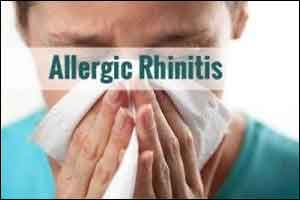- Home
- Editorial
- News
- Practice Guidelines
- Anesthesiology Guidelines
- Cancer Guidelines
- Cardiac Sciences Guidelines
- Critical Care Guidelines
- Dentistry Guidelines
- Dermatology Guidelines
- Diabetes and Endo Guidelines
- Diagnostics Guidelines
- ENT Guidelines
- Featured Practice Guidelines
- Gastroenterology Guidelines
- Geriatrics Guidelines
- Medicine Guidelines
- Nephrology Guidelines
- Neurosciences Guidelines
- Obs and Gynae Guidelines
- Ophthalmology Guidelines
- Orthopaedics Guidelines
- Paediatrics Guidelines
- Psychiatry Guidelines
- Pulmonology Guidelines
- Radiology Guidelines
- Surgery Guidelines
- Urology Guidelines
First vaccine in the world developed against grass pollen allergy

Around 400 million people worldwide suffer in some form or other from a grass pollen allergy (rhinitis) -- with the usual symptoms such as a runny nose, cough, and severe breathing problems. In collaboration with the Viennese firm Biomay AG, MedUni Vienna researchers at the Institute of Pathophysiology and Allergy Research have now shown in a Phase II-b study with 180 patients in 11 European centres, that four injections of the synthetically manufactured vaccine BM32 in the first year and a top-up in the second year of treatment relieve the sufferers' symptoms by at least 25%.
Immunotherapy with BM32 is based on an innovative recombinant peptide-carrier technology, which requires far fewer injections and has fewer side-effects than other immunotherapies for allergy sufferers. This technology was developed at the Christian Doppler Laboratory for Allergy Research at MedUni Vienna, under the direction of Rudolf Valenta, in collaboration with Viennese partner company Biomay AG (CEO: Rainer Henning). This company specialises in discovering and developing innovative allergy therapeutics.
Revolutionary product
The vaccine that is used and the requisite antibodies can be synthetically manufactured. This involves extracting the B-cell-reactive peptides from the allergen using a technology developed in Vienna. These peptides are modified so that they lose their bonding properties for allergen-specific IgE and serve as carrier proteins for the necessary support from T-cells. "This process can be repeated an infinite number of times but the vaccine retains its efficacy, is always of equal quality and safe," explains Valenta. "This is a Viennese product that will revolutionise the treatment of grass pollen allergies." The Medical University of Vienna has transferred the patent for production to Biomay AG.
On average, there was a 25% improvement in symptoms. "The more severely the allergy sufferer is affected by grass pollen, the greater the beneficial effect following vaccination," explains Verena Niederberger-Leppin from MedUni Vienna's Department of Ear, Nose and Throat Diseases and lead author of the study, which has now appeared in the "Journal of Allergy and Clinical Immunology" -- receiving a huge amount of international attention. The researchers are assuming that the symptoms will diminish even further if the vaccination is topped up for a period of years (the available data relates to a study period of two years). Moreover, it could potentially also be used preventatively.
Approval of the vaccine scheduled for 2021
A follow-on Phase III study and a simultaneous child vaccination study in compliance with all applicable guidelines is scheduled to start in 2019, to create the prerequisites for general approval of the vaccine from 2021.
At the same time, the investigations into the efficacy of BM32 have shown that the vaccine might also be an effective treatment for hepatitis B and could also bring relief to asthma patients. The MedUni Vienna researchers and experts at Biomay AG believe that other potential applications of BM32 are the treatment of allergies to dust mites, cats, and ragweed pollen.
To read full article click on the link given below.
Verena Niederberger, Angela Neubauer, Philippe Gevaert, Mihaela Zidarn, Margitta Worm, Werner Aberer, Hans Jørgen Malling, Oliver Pfaar, Ludger Klimek, Wolfgang Pfützner, Johannes Ring, Ulf Darsow, Natalija Novak, Roy Gerth van Wijk, Julia Eckl-Dorna, Margarete Focke-Tejkl, Milena Weber, Hans-Helge Müller, Joachim Klinger, Frank Stolz, Nora Breit, Rainer Henning, Rudolf Valenta. Safety and efficacy of immunotherapy with the recombinant B-cell epitope–based grass pollen vaccine BM32. Journal of Allergy and Clinical Immunology, 2018; DOI: 10.1016/j.jaci.2017.09.052
Biomay AGbreathing problemsgrass pollen allergyimmunotherapyInstitute of Pathophysiology and Allergy ResearchrhinitisVaccinevaccine BM32
Source : Press ReleaseNext Story
NO DATA FOUND

Disclaimer: This site is primarily intended for healthcare professionals. Any content/information on this website does not replace the advice of medical and/or health professionals and should not be construed as medical/diagnostic advice/endorsement or prescription. Use of this site is subject to our terms of use, privacy policy, advertisement policy. © 2020 Minerva Medical Treatment Pvt Ltd